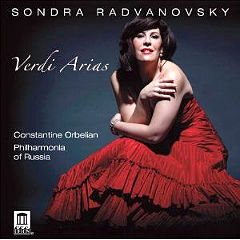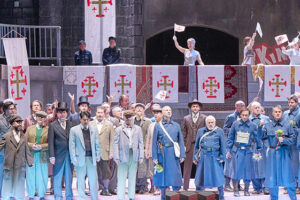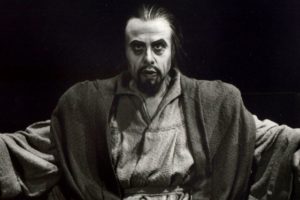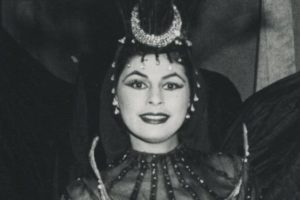
The career of Sondra Radvanovsky has had an odd trajectory. A veteran of the National Council Auditions and the Lindemann Young Artists program, much of her work has centered on the Metropolitan Opera, which her press materials call her “home” theater. Yet her early career there was slow in starting. After numerous Aida Priestesses, around the turn of the century, her fortunes bettered and she became the regular Trovatore Leonora and Luisa Miller. Aficionados began calling her the Verdi soprano to watch.
Then with the new regime came rumors that her career at her “home” was finished. That all seems to have changed now and she is regularly scheduled for roles in high profile performances including HD telecasts and new productions. In a recent New York Times puff, sorry, profile, Peter Gelb is quoted as saying, “she matured as an artist, and I found her much more compelling as a performer.”
This Delos release of Verdi Arias is her first solo album and does a pretty good job of showcasing her virtues. Unfortunately the microscope of recording also highlights her faults.
First the good news: Radvanovsky is a bona-fide dramatic soprano with a gorgeous dark color, a shimmery vibrato (something I love), and an incredibly secure technique. The voice generally moves well (although the runs in “Ernani, involami” and the Vespri Bolero are a bit labored), and the top is big, bright, and exciting. She can sing a real piano at the top and does it musically. This is the kind of voice I had been waiting for and I’ve been enthusiastic since first hearing her a decade ago.
So why can’t I muster much enthusiasm for this disc?
The first problem is one that has been talked about on the blogs recently and which was exposed cruelly in her recent Met Toscas. Very often the darkness of her color causes the sound to hang on the underside of the pitch. On this disk it is not frequently evident, but when it is (particularly in “La vergine degl’angeli”) it is, to quote Mark Antony, “a grievous fault.”
The other is a lack of personality in her approach to the text. In this repertoire she seems to be content with emitting beautiful sounds without any specificity of verbal communication. She seems well-coached in that most of the double consonants in the Italian are in place (although I notice the occasional dipthong on the vowel “e”), but Ms. Radvanovsky seems to forget that there is value to the single consonants as well. They are invariably lightly glossed over and the emotional impact of the words is lost.
She regularly shortchanges beginning consonants (there is nary a beginning “c” to be heard) and minimizes internal single consonants. For someone who professes to admire Callas’s attention to the text, she seems not have learned the lesson.
Il corsaro is certainly not one of Verdi’s greatest works, yet the beautifully eerie aria “Non so le tetre immagini” is imaginatively scored and with the right interpreter can be extremely effective. Yet something like this cries out for some extra attention, which Radvanosky doesn’t give it. She sings a very even, efficient, legato, but the aria doesn’t work because it entirely lacks imagination. The somewhat oddly written internal ornaments seem to be a rest-stop on the way to the end of the word and not the impetus to it
She is not helped by the flaccid conducting of Constantine Orbelian and a men’s choir (in the Forza excerpt) who apparently don’t think it’s important to articulate any text at all (Not that it matters. They’re generally overbalanced by the orchestra anyway).
There are signs of potential greatness, however. “O patria mia” seems very promising if still unformed. There is more passion in her singing here and she easily soars over the orchestra in the tricky climaxes of the aria (if only she’d sing an “m” every now and again in “mai pìu.”) I also rather like the Vespri aria “Arrigo! Ah, parli a un cor” with her gorgeous upward leaps and beautiful negotiated top notes. A little more emphasis on the word “muoio” and I might have bought it.
And I might have bought this release too. Despite my caveats, Radvanovsky is a real talent and one that I regularly enjoy on stage. Yet unless she develops a more personal approach to the words (and fixes her pitch issue), I fear she’s destined to join the ranks of Mary Curtis-Verna, Elinor Ross, and the other also-rans who fill in the gap in the rep until they either fall apart or someone better comes along. And that would be a shame, because this is a voice that cries out for more attention.
























Comments